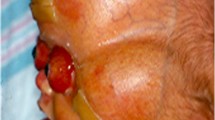Abstract
Pfeiffer syndrome is a skeletal disorder characterized by craniosynostosis associated with foot and hand anomalies. Mutations in the genes encoding fibroblast growth factor receptors 1 and 2 (FGFR1 and FGFR2) have recently been implicated in the aetiology of such a syndrome, as well as of other craniosynostotic conditions. We now report a novel missense mutation, a G to C transversion at position 1049 (exon IIIa) of FGFR2, detected in a patient with severe Pfeiffer clinical features. The mutation results in the substitution of a cysteine for tryptophan-290 in the third immunoglobulin-like domain and affects both spliceoforms of FGFR2. Mutations causing replacement of tryptophan-290 have also been reported previously in Crouzon syndrome, a similar but clinically distinct craniosynostotic disorder. This finding confirms the involvement of mutations of FGFR2 exon IIIa in Pfeiffer syndrome, and emphasizes both the extensive heterogeneity of the FGFR2 mutations that result in the Pfeiffer phenotype and the perturbations caused by unpaired cysteine residues in receptor dimerization and transduction of the FGFs signal.
Similar content being viewed by others
Author information
Authors and Affiliations
Additional information
Received: 15 August 1996 / Revised: 19 October 1996
Rights and permissions
About this article
Cite this article
Tartaglia, M., Valeri, S., Velardi, F. et al. Trp290Cys mutation in exon IIIa of the fibroblast growth factor receptor 2 (FGFR2) gene is associated with Pfeiffer syndrome. Hum Genet 99, 602–606 (1997). https://doi.org/10.1007/s004390050413
Issue Date:
DOI: https://doi.org/10.1007/s004390050413




